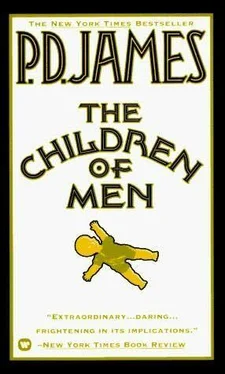It was accepted that this was a global disaster and that it must be met by the response of a united world. We still, in the late 1990s, spoke of Omega in terms of a disease, a malfunction which would in time be diagnosed and then corrected, as man had found a cure for tuberculosis, diphtheria, polio and even in the end, although too late, for AIDS. As the years passed and the united efforts under the aegis of the United Nations came to nothing, this resolve of complete openness fell apart. Research became secret, nations’ efforts a cause of fascinated, suspicious attention. The European Community acted in concert, pouring in research facilities and manpower. The European Centre for Human Fertility, outside Paris, was among the most prestigious in the world. This in turn co-operated, at least overtly, with the United States, whose efforts were if anything greater. But there was no inter-race co-operation; the prize was too great. The terms on which the secret might be shared were a cause of passionate speculation and debate. It was accepted that the cure, once found, would have to be shared; this was scientific knowledge which no race ought to, or could, keep to itself indefinitely. But across continents, national and racial boundaries, we watched each other suspiciously, obsessively, feeding on rumour and speculation. The old craft of spying returned. Old agents crawled out of comfortable retirement in Weybridge and Cheltenham and passed on their trade craft. Spying had, of course, never stopped, even after the official end of the Cold War in 1991. Man is too addicted to this intoxicating mixture of adolescent buccaneering and adult perfidy to relinquish it entirely. In the late 1990s the bureaucracy of espionage flourished as it hadn’t since the end of the Cold War, producing new heroes, new villains, new mythologies. In particular we watched Japan, half-fearing that this technically brilliant people might already be on the way to finding the answer. Ten years on we still watch, but we watch with less anxiety and without hope. The spying still goes on but it is twenty-five years now since a human being was born and in our hearts few of us believe that the cry of a newborn child will ever be heard again on our planet. Our interest in sex is waning. Romantic and idealized love has taken over from crude carnal satisfaction despite the efforts of the Warden of England, through the national porn shops, to stimulate our flagging appetites. But we have our sensual substitutes; they are available to all on the National Health Service. Our ageing bodies are pummelled, stretched, stroked, caressed, anointed, scented. We are manicured and pedicured, measured and weighed. Lady Margaret Hall has become the massage centre for Oxford and here every Tuesday afternoon I lie on the couch and look out over the still-tended gardens, enjoying my State-provided, carefully measured hour of sensual pampering. And how assiduously, with what obsessive concern, do we intend to retain the illusion, if not of youth, of vigorous middle age. Golf is now the national game. If there had been no Omega, the conservationists would protest at the acres of countryside, some of it our most beautiful, which have been distorted and rearranged to provide ever more challenging courses. All are free; this is part of the Warden’s promised pleasure. Some have become exclusive, keeping unwelcome members out, not by prohibition, which is illegal, but by those subtle, discriminating signals which in Britain even the least sensitive are trained from childhood to interpret. We need our snobberies; equality is a political theory not a practical policy, even in Xan’s egalitarian Britain. I tried once to play golf but found the game immediately and totally unattractive, perhaps because of my ability to shift divots of earth, but never the ball. Now I run. Almost daily I pound the soft earth of Port Meadow or the deserted footpaths of Wytham Wood, counting the miles, subsequently measuring heartbeat, weight loss, stamina. I am just as anxious to stay alive as anyone else, just as obsessed with the functioning of my body.
Much of this I can trace to the early 1990s: the search for alternative medicine, the perfumed oils, the massage, the stroking and anointing, the crystal-holding, the non-penetrative sex. Pornography and sexual violence on film, on television, in books, in life, had increased and became more explicit but less and less in the West we made love and bred children. It seemed at the time a welcome development in a world grossly polluted by over-population. As a historian I see it as the beginning of the end.
We should have been warned in the early 1990s. As early as 1991 a European Community Report showed a slump in the number of children born in Europe—8.2 million in 1990, with particular drops in the Roman Catholic countries. We thought that we knew the reasons, that the fall was deliberate, a result of more liberal attitudes to birth control and abortion, the postponement of pregnancy by professional women pursuing their careers, the wish of families for a higher standard of living. And the fall in population was complicated by the spread of AIDS, particularly in Africa. Some European countries began to pursue a vigorous campaign to encourage the birth of children, but most of us thought the fall was desirable, even necessary. We were polluting the planet with our numbers; if we were breeding less it was to be welcomed. Most of the concern was less about a falling population than about the wish of nations to maintain their own people, their own culture, their own race, to breed sufficient young to maintain their economic structures. But as I remember it, no one suggested that the fertility of the human race was dramatically changing. When Omega came it came with dramatic suddenness and was received with incredulity. Overnight, it seemed, the human race had lost its power to breed. The discovery in July 1994 that even the frozen sperm stored for experiment and artificial insemination had lost its potency was a peculiar horror casting over Omega the pall of superstitious awe, of witchcraft, of divine intervention. The old gods reappeared, terrible in their power. The world didn’t give up hope until the generation born in 1995 reached sexual maturity. But when the testing was complete and not one of them could produce fertile sperm, we knew that this was indeed the end of Homo sapiens. It was in that year, 2008, that the suicides increased. Not mainly among the old, but among my generation, the middle-aged, the generation who would have to bear the brunt of an ageing and decaying society’s humiliating but insistent needs. Xan, who had by then taken over as the Warden of England, tried to stop what was becoming an epidemic by imposing fines on the surviving nearest relations, just as the Council now pays handsome pensions to the relations of the incapacitated and dependent old who kill themselves. It had its effect; the suicide rate fell compared with the enormous figures in other parts of the world, particularly countries whose religion was based on ancestor worship, on the continuance of a family. But those who lived gave way to the almost universal negativism, what the French named ennui universal. It came upon us like an insidious disease; indeed, it was a disease, with its soon-familiar symptoms of lassitude, depression, ill-defined malaise, a readiness to give way to minor infections, a perpetual disabling headache. I fought against it, as did many others. Some, Xan among them, have never been afflicted with it, protected perhaps by a lack of imagination or, in his case, by an egotism so powerful that no external catastrophe can prevail against it. I still occasionally need to struggle but I now fear it less. The weapons I fight it with are also my consolations: books, music, food, wine, nature.
These assuaging satisfactions are also bittersweet reminders of the transitoriness of human joy; but when was it ever lasting? I can still find pleasure, more intellectual than sensual, in the effulgence of an Oxford spring, the blossoms in Belbroughton Road which seem lovelier every year, sunlight moving on stone walls, horse-chestnut trees in full bloom, tossing in the wind, the smell of a bean field in flower, the first snowdrops, the fragile compactness of a tulip. Pleasure need not be less keen because there will be centuries of springs to come, their blossom unseen by human eyes, the walls will crumble, the trees die and rot, the gardens revert to weeds and grass, because all beauty will outlive the human intelligence which records, enjoys and celebrates it. I tell myself this, but do I believe it when the pleasure now comes so rarely and, when it does, is so indistinguishable from pain? I can understand how the aristocrats and great landowners with no hope of posterity leave their estates untended. We can experience nothing but the present moment, live in no other second of time, and to understand this is as close as we can get to eternal life. But our minds reach back through centuries for the reassurance of our ancestry and, without the hope of posterity, for our race if not for ourselves, without the assurance that we being dead yet live, all pleasures of the mind and senses sometimes seem to me no more than pathetic and crumbling defences shored up against our ruins.
Читать дальше












